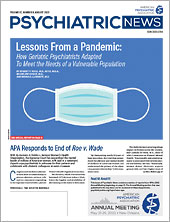Dealing with a psychiatric medical malpractice claim or board complaint can be challenging as well as worrisome. Patient deaths and complaints are often inevitable. However, you can minimize risk by understanding the typical allegations patients make.
•
Frequent types of medical malpractice allegations: The most common types of medical malpractice allegations brought against psychiatrists include improper assessment of suicidal or violent patients, wrongful death, medication errors, boundary and ethics violations, improper termination of care, failure to diagnose and treat, improper discharge, and vicarious liability.
•
Claim severity: The types of claims typically resulting in large verdicts and settlements include injuries stemming from expensive or extended treatment such as neurological impairment, significant disability, or wrongful death.
Here are some risk management tips for reducing risk and responding to claims:
Be sure to document all communications with patients (including texts, telephone messages, and emails) into the medical record. Always assess and document suicidal ideation or lack thereof for each visit. Always document informed consent, including discussion of risks, benefits, and alternative treatments.
When providing care to minors with divorced parents with joint custody, both parents need to consent to treatment. In the event of suspected child abuse, report to the appropriate agency promptly.
If you are providing telehealth services, licensure needs to be in the state where the patient is physically located at the time of the visit, and you are required to follow the laws and regulations for practicing medicine in that state.
When terminating patient care, always provide at least three resources where patients can find a mental health professional (such as their health insurer) and provide sufficient notice to maintain continuity of care (typically 30 days, but check state law).
While communicating with patients via text messages has become commonplace, maintaining proper boundaries is important. Limit texting to scheduling appointments when possible. Do not friend, follow, or communicate with patients on social media platforms. Patients should be instructed not to use email or text to contact you for emergencies.
In the event of a patient’s death, you may express your condolences to the patient’s family. The privacy rule provides the same patient privacy rights in death as it does in life and may include additional protection under state law. Details of a deceased patient’s treatment and/or medical record may be released only to a personal representative, such as an executor, administrator, or other person appointed under state law. If you are approached by a deceased patient’s family and are unsure how to respond, contact your risk professional for advice.
In the event you receive a lawsuit, written demand for compensation, licensing board complaint, subpoena, medical records request, or court order, immediately notify your insurance carrier. Keep in mind that a board complaint can result in fines, reputational damage, license suspension or limitations, and even complete license revocation. If a lawsuit is initiated, do not communicate directly with any parties to the litigation before consulting with your attorney. Do not admit liability, and understand how the apology statutes operate in your state. Do not communicate directly with the plaintiff’s attorneys, and do not offer a settlement without speaking to your insurance carrier.
Never alter the patient’s medical record. Altering a medical record may give the appearance of tampering with evidence and imply guilt. Following good risk management principles can go a long way toward avoiding a lawsuit and/or board complaint and to help strengthen your defense should one be filed. ■
Risk management services are provided as an exclusive benefit to insureds of the APA-endorsed American Professional Agency Inc. liability insurance program. This information is provided as a risk management resource for Allied World policyholders and should not be construed as legal or clinical advice. This material may not be reproduced or distributed without the express, written permission of Allied World Assurance Company Holdings, Ltd, a Fairfax company (“Allied World”). Risk management services are provided by or arranged through AWAC Services Company, a member company of Allied World. © 2022 Allied World Assurance Company Holdings Ltd. All Rights Reserved.

